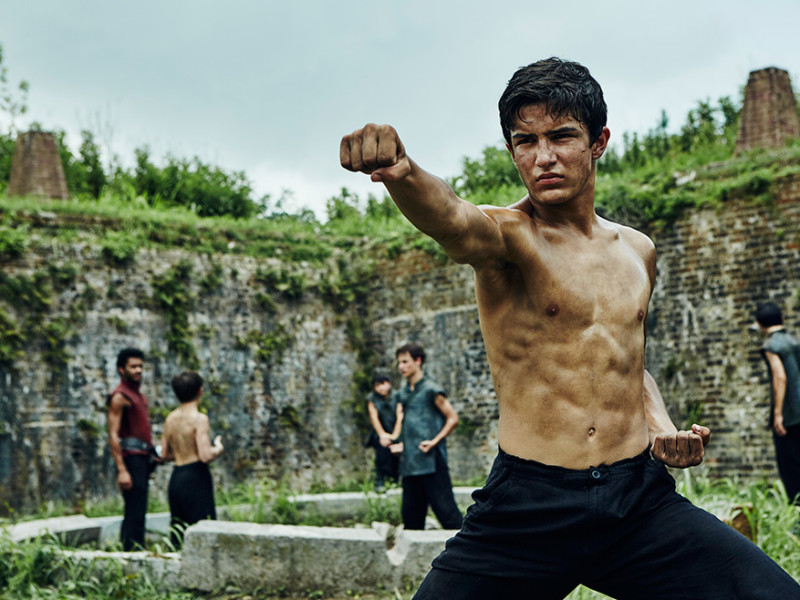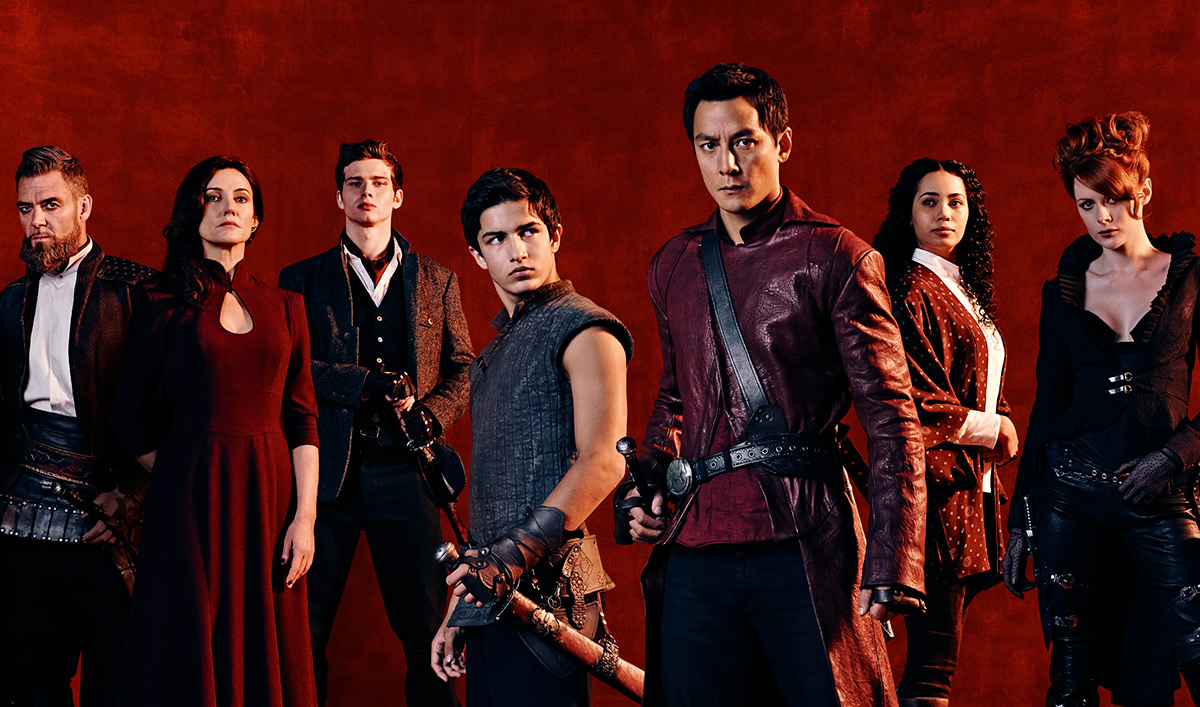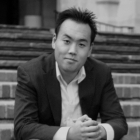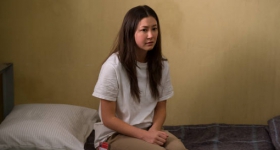Daniel Wu is a Chinese American actor/director/writer/producer that has already had quite an impressive career overseas in Hong Kong, appearing in over 60 films there – many of them box-office hits – and also winning awards for his directing, producing and performance work (such as the “Best New Director Award” at the Hong Kong Film Awards for his directorial debut The Heavenly Kings (2006), which he also wrote, produced and starred in, and a Golden Horse Award for “Best Supporting Actor” in Jackie Chan’s New Police Story (2004)). He will also be starring in Duncan Jones’ Warcraft movie in 2016, and previously appeared in Go Away Mr. Tumour (2015), That Demon Within (2014), Europa Report (2013), Chinese Zodiac (2012), The Man with The Iron Fists (2012), Tai Chi Hero (2012), Tai Chi Zero (2012), Inseparable (2011) (opposite Kevin Spacey), Shinjuku Incident (2009), Blood Brothers (2007), Protégé (2007), Robin-B-Hood (2006), The Banquet (2006), Divergence (2005), House of Fury (2005), Around The World in 80 Days (2004), Enter The Phoenix (2004), Naked Weapon (2002), Love Undercover (2002), Gen-X Cops (1999) and much more. Wu breaks into American TV airwaves on Sunday, November 15th (at 10/9c) with the debut of AMC’s Into The Badlands, which has been receiving buzz as a hotly-anticipated new martial arts drama/action television show featuring not just one but two Asian American leads – Aramis Knight, a young actor of Pakistani and East Indian descent, also plays supporting character “M.K.” alongside Wu’s main protagonist “Sunny”. Timothy Tau got the chance to talk with Wu, and in this installment of The Talks readers will appreciate his illuminating answers, in-depth insight no doubt informed by seasoned experience and hard-won achievements on both sides of the Pacific.
Congratulations on the show being produced and premiering on November 15th. Can you describe the process that led to the show being made and you in particular being cast as the lead?
Sure, I was on board as an Executive Producer at first. And wasn’t meant to be in the lead role. At least I thought I wasn’t meant to be in the lead role. Stacy Sher, one of our producing partners who spear-headed this whole project, was at the premiere of the Man with the Iron Fists (in which Daniel appears) in New York. There, she happened to run into the head of production at AMC, Joel Stillerman, and they were talking and they were like “why isn’t there anything like this on television? We should do something like this.” And so that’s kind of how it got started, and she called me about a week later and said “Hey Daniel, I got this content deal with AMC and they want to do a martial arts show but I’ve never done martial arts before in terms of film or TV, can you help me do it and do you think we can do it on television?” I was like, yeah I think we can do it, but only if we can bring in a Hong Kong stunt crew on board because I know for TV its going to be really fast-paced, and we’re not really going to have the time to really suss out scenes like the way we do in movies, so we need to bring on a HK crew to do things quickly.
And so then I assembled a team, I brought Stephen Fung on as my producing partner, who ended up being the Fight Director, then we hired Master Dee-Dee (Huan-Chiu Ku), and we first got together with the other producers and sort of brainstormed what this world could be. Then we found Al Gough and Miles Millar, the showrunners and screenwriters, and they went off and wrote and created the whole world of the Badlands. They came back later with these characters and this story and with that, we pitched it to AMC again.
And that was actually the easiest part of the whole process. We pitched it (to AMC) and took a two-hour meeting, walking out of there thinking it would be a couple of weeks before we heard back. An hour later, they called back and were like: “we want it.”
Wow. Awesome that it had that high of a demand. What happened next?
So then we spent the next year kind of setting it all up and writing the rest of the script and trying to figure out budgets and all of that good stuff to put the whole thing together. Then one of the big questions was: who was gonna play Sunny? In my mind, I thought it would be best to find somebody in their late 20s or early 30s because if the show becomes successful, it could go on for five or six years, and in the first season of six episodes we have 12 fights, and Sunny fights in 11 of those fights, so that’s just a crazy amount of fight work. Even Jackie Chan doesn’t do that in a movie! Maybe he does 3-4 fights over 6 months. It just takes a lot of endurance and ability to be able to pull that off over that period of time.
That’s why I thought we should look for a younger dude. Then we auditioned a whole bunch of people, and AMC, to their credit, was really adamant that the character (of Sunny) remain Asian or be Asian, even when he didn’t have to be – he could have been Latino American or African American or whatever – they still wanted him to be Asian, so we had to look for this match and thus auditioned a whole bunch of people.
We ended up finding either great actors that knew nothing about martial arts or good martial artists that couldn’t act, and obviously there was a handful of people that could do both. But the producers were still not satisfied yet, so finally they turned to me and were like: “You know you ought to throw yourself into the mix, you cannot ‘not do this’” and one thing I was concerned about was: I’m almost 40, I’m 41 now, and I wasn't sure if I could handle that kind of schedule; fighting like that for 5 or 6 years because that’s insane! It’s like you’re basically asking Kobe Bryant to come back after all that time and perform on the same level that he was performing at before. So you know it’s not an easy thing to do.
So once I started thinking about how to get ready for the training – because I hadn’t done a martial arts film in 6 or 7 years – I mean I’ve done action stuff in that time and still kept the training up, but I haven’t done a film in 6-7 years and you really have to be ready for that. And so I got together with some friends to think about how to train for this and get ready for it, once I figured out a plan I thought “OK, I think I can do this.” So I did my audition, and the producers compared it with everyone else’s and in the end they decided to choose me. But I expected that the other producers wanted me to do it from the very beginning.

And make you do all that work to get there. Just as a testament to your training and the fight direction, I saw the martial arts sequences in the first two episodes and was really blown away, even saying on Facebook that the fight scenes were among the best martial arts choreography I’ve seen on TV and on film in 2014-2015, maybe only the sequences from The Raid II: Berandal coming close. They were also aesthetically cool and more appealing than scenes from Wong Kar Wai’s The Grandmaster, such as that fight scene in the rain, next to the car. Can you describe your experience training and rehearsing choreography with Fight Director Stephen Fung, and how your past work with Fung - such as the Tai Chi Hero/Zero series, House of Fury, Jump, Enter The Phoenix and as co-stars in Gen-X Cops - informed that process?
We’ve known each other for 18 years. We were in our first film together as actors maybe 17 years ago (Bishonen (1998)), and then did Gen-X Cops (1999), and so on, and in between those movies we would hang out and he would film these little short films on his DV camera, and it was very obvious that he was a good director; he just had that natural instinct. And so, I kept encouraging him to become a director, and finally he did it, with Enter The Phoenix (2004) being his first film - and I played the lead role in that movie, to support a brother, you know. And I’ve been in every movie he’s done since then, like 5-6 films, and so we know each other really well as friends and we also know each other really well as working partners, and furthermore, we started our own production company like 5 years ago. Therefore, we have a really good shorthand – we know how to communicate with each other efficiently, and part of this whole process is that he trusts me totally and we don’t need to worry about (miscommunication) at all. And then we can get the work done really quickly.
Right, because you were mentioning before the advantage of using a Hong Kong crew was the speed.
Yeah because dude, for TV you have to work freakin’ fast. We basically had eight days per episode. And there’s (at least) two fights per episode! So you have to budget out those eight days for those two fights, and for example that rain fight took six days to make, but the rain fight in Wong Kar Wai’s The Grandmaster took thirty (30) days. So, it’s an incredibly short amount of time to pull off those fights in the way we did them. Also, it’s important to have someone like Stephen, who is a master with the camerawork and someone like Master Dee-Dee, who is a master choreographer, and we had to put those two sides together and make them work smoothly.
The setting of the show is very specific, yet something we really haven't seen before, e.g., sort of a combination of the Southern-Western Gothic environment of Tarantino's Django Unchained (Django Unchained producers Stacy Sher and Michael Shamberg are also executive producers on the show, as are you), Mad Max and every wu xia or period martial arts film ever made. Can you elaborate on the original vision from show creators Alfred Gough and Miles Millar (who also created "Smallville" and wrote the screenplays for the films Lethal Weapon 4, Shanghai Noon, Shanghai Knights, Spider Man 2, and The Mummy: Tomb of the Dragon Emperor), and how did you help build it?
So one idea was to set the show in the past, kind of like Kung Fu (the 1972-1975 TV series starring David Carradine). In fact, one of the initial ideas was to “reboot” Kung Fu, but we were eventually like, nah let’s not do that – it was an iconic show but it wasn’t the greatest show and the action was horrible, right? (Both laugh). And it was also weird, like a Chinese dude wandering the West, it might have been a good idea then but not necessarily a good idea now.
Essentially, we had to think of a world where guns didn’t exist, because if there were 30 dudes surrounding Sunny each equipped with AK-47s, he ain’t getting out of that room. (Both laugh). So we had to set it in a world where kung fu made sense. So we said OK, lets put it in a post-apocalyptic future but it is a very far-away future where it’s not a society that’s totally out of control and chaotic, but instead a society that has reset itself and kind of reformed itself, and the Badlands is that society where society has kind of gone back to feudal times, and one of the main ideas was this “Steampunk” aesthetic, to make things futuristic yet seem old at the same time since in this world, digital technology is all gone, there’s no digital stuff anymore, we don’t have computers to run anything, so all the cars have to be cars that run like they did before the 1980s without computers in them. So a 2015 car in our world wouldn’t even work 100 years from now at all, because that technology would become obsolete, and if chips break you can’t replace them; however mechanical stuff you can keep running.
So that’s why all the cars in the show are like older muscle cars, or older cars from the 40s because those things are what society has been able to save. And then even the motorcycle that Sunny rides is a “Steampunk” motorcycle, and something that someone could work on even without digital technology.
How about the wardrobe and costume design?
It’s the same thing with the clothes and fashion of this world, everything is hand-made in the world now, so things have gone back to older times where we have to learn how to make things by our own hand; we don’t know how to do that anymore. I mean like a hundred years ago, your Mom had to make your clothes for you, right? So we’ve lost that skill now, but in a world where we’ve lost digital technology (like the show), you still have global consumerism. Therefore, you still have to make stuff on your own again. So that’s kinda how that world looks and feels. Everything is simply hand-made.
And what I love most about all this post-apocalyptic stuff is not really how it is a projection of the future, but really a reflection of modern society today. Like for example, the fact that guns have been banned in the Badlands is kind of an ironic statement considering that nowadays the gun violence in America is at its craziest peak right now, where we’re having like one mass shooting a week. It’s not an overt political statement or anything, but part of the subtle things we threw in there to get people to think and be engaged with this world.
The show is also said to be loosely based on Journey to the West, a piece of classic Chinese literature by Wu Cheng’En about The Monkey King aka Son Wu Kong, who eventually accompanies the monk Tripitaka and several other supernatural allies on an adventure towards enlightenment. It seems parallels can be drawn between Son Wu Kong and Sunny, as well as MK (Aramis Knight) and Tripitaka - or the other way around, if the MK may be interpreted as possibly standing for the "Monkey King". Could you maybe discuss the parallels with the mythical story?
Sunny’s name comes from Son Wu Kong and MK stands for “Monk” which is a reference to Tripitaka the monk, but we’re not playing those characters. We’re playing their essences. The journey the Monkey King goes on is to take the Buddha scriptures from China to India, and through that process he changes as a person – at the beginning, he’s a really naughty and rebellious, feisty character who fights all the time and at the end, he becomes enlightened and more tranquil and peaceful. These mythical stories are allegories for life. And the parallel is that the show is a story about these two people who travel on a journey together where they also learn from each other, and how they change as people through that journey. So the mythical parallels are more about that ‘journey’ element, and the essence of the journey. So it’s not really a literal translation.

And speaking of you and Aramis Knight being the two main lead characters - the show has also been applauded as featuring not just one but two Asian American leads - yourself in the main protagonist role of Sunny, and Aramis being an actor of German, Eastern Indian and Pakistani descent as "M.K." Will the show eventually lead to even more opportunities for Asian American actors to play fuller, more complex and engaging roles? How do you view the current landscape of TV and film roles for Asian American actors?
First of all I want to say it’s great we’ve done all these things, but to describe our intentions to begin with, we weren’t trying to change the state of American media. It just so happened we wanted to make a really cool project that people could get behind, and it just so happens that the two leads are Asian American. For MK (the character that Aramis plays), we auditioned all kinds of people of all different ethnicities. And we found Aramis. But I didn’t find out until later that he was part Pakistani. Also for me, it was a direct choice of the show that Sunny had to be Asian. But I don’t think there was ever the intention to transform the face of American media culture, you know what I mean? We wanted to make a kickass martial arts drama, and it just so happens to be that I’m Chinese American.
But I see that things are changing with shows like Fresh Off The Boat and Dr. Ken and The Heroes Reboot, Heroes itself and Lost and Hawaii Five-0, we’re starting to see more of a reflection of our society in the media today. And it happened faster on television than it did on movies, but it’s also happening in movies as well because China is a huge market for Hollywood films nowadays, and so American producers are realizing that if they put Chinese actors in their films, then that will improve the chances of their films being more successful in China. And globally. So that’s more of a financial decision than producers or executives being good people with good hearts going, “yes, I need to accurately reflect the true composition of American society.” (Both laugh). Its definitely more of a financial thing, but hey, I’ll take it. If it’s going to help Asian American actors or artists get more exposure, then why the hell not?
But that’s the truth behind it all: it is that you have to do something commercially successful in order to make a change. Because if you do a little Asian American drama about Asian American issues, whose going to watch that? Asian Americans will get it, but not many other people are going to watch that. I’ve seen that with films like (Chris Chan Lee’s) Yellow in the early 2000s, which is a great film but which catered to more of a limited or specific audience – even Asians in Asia don’t care about that kind of stuff. They simply don’t care about Asian American issues. (Both laugh).
So, in order to be successful or be a game-changer in a certain way, you've got to do mainstream projects that speak to mainstream audiences, and it just so happens that in those projects, the characters are Asian or Asian American. So in some ways, Justin Lin’s Better Luck Tomorrow was successful because it was a compelling story, and all the characters just happened to be Asian American, but they didn’t have to be. So I think that’s where Justin Lin was really successful, e.g., because he made a cool story about Asians but it really wasn’t about or limited to just Asians.
Great points. Related to something you were saying before about appealing to wider audiences, you guys are definitely doing a cool take on the martial arts genre. And there’s been shows before like Kung Fu, Vanishing Son with Russell Wong, Martial Law with Sammo Hung, and so on. What is your response to critics or actors who say that the martial arts genre perhaps limits roles for Asian American actors? Is there an argument that the genre may also expand roles? Do you view the martial arts genre as being a part of the diversity and full "color spectrum" of cultural facets unique to the Asian American experience?
I totally understand that and see how the martial arts role can be limiting, but again, I can also totally see it as a springboard for something else. So to be Asian American and sort of hate the martial arts genre because its limiting to you is not really fair because just look at what’s happening in Asia: do you think that when Wong Kar Wai or Hou Hsiao Hsien make a nationally revered kung fu movie, people are saying they are perpetuating stereotypes? Or that it’s a stereotype of Chinese people? No. Chinese people have been making kung fu movies for ages. It simply is an undeniable and proud part of our mainstream culture.
So making a kung fu movie in China is not considered stereotyping at all; only when I come here to America and white people are looking at it, then that “Asian American issue” arises of it being “stereotypical” or perpetuating stereotypes. So it depends on which side of the fence you’re standing on. And me being a martial artist and also being Asian, I don’t have any real problem with that. But I can see how someone like Sung Kang, who may not know martial arts but who is offered only martial arts roles, can become frustrated because there IS a lot more to Asian culture than just martial arts.
What’s known about Asian culture by popular society is martial arts, just like how hip hop is connected to African American culture. That is a major facet of African American culture, but not the only facet. So I’m sure African American actors feel the same way when asked to play a rapper and feel stereotyped when doing so.
Definitely. I feel the more effective approach is to embrace those different cultural aspects, interpret them in new ways, and not to try and pigeon-hole actors in certain roles or associate them with outdated concepts.
Yeah, I mean if that’s the only thing being made (martial arts films), then that’s almost an exploitation and it becomes like the blaxploitation films of the 70s. But that’s not what is happening. I mean, Fresh Off The Boat is a successful sitcom talking about an Asian American family trying to survive in a white suburb, you know? So it’s kinda cool and fresh and different. And then Dr. Ken is also another Asian American sitcom or family comedy-drama about this doctor, and critics can say “Oh, that’s a stereotype too, playing an Asian American doctor” but he REALLY is a doctor! And he really is Asian American, and Korean American. So that is his life; that is his story.

What do you view as the future of cinema as it involves Asian or Asian American talent, especially from your experience being involved in both the Hollywood and Hong Kong/Chinese/Asian entertainment industries? Do you feel there will be more USA/China cross-cultural productions, and will that be a good thing for Asian American actors, directors and writers? What do you think needs to be changed? What do you think is being done well now that should be strengthened for the future?
I think that’s going to be a part of the growth in Asia, but I don’t think that’ll be the only part of it. Hollywood is a very powerful force, and they want to get into that market and they will try all they can to get a piece of that pie. And what they are realizing now is that they do have to integrate more facets of Chinese culture into their films to make things more interesting for global audiences, and to have box office successes, both in the U.S. and in China (which is a back-up plan for many films to recoup losses they’ve incurred in the U.S. nowadays).
What's next for you, or are you also working on any interesting projects at the same time as "Into The Badlands"? If the show becomes successful Stateside, do you have any dream projects you want to do, waiting in the queue?
I have this dream project I want to do. There’s this legendary story about this mafia member, he was a part of the Italian mafia in Chicago but he was Japanese American. His name was Tokyo Joe or Montana Joe (Ken Eto). And it’s a really fascinating true story, about this guy who was pretty much a “made man” in the Chicago mafia, and he came up really really high in their ranks during the 80s, and also, because he got really high up, some other Italian mafia members were jealous of him. Thus, some of these other mobsters tried to execute him, "whack" him, pretty much. So he was taken out one day, and they shot him two times point-blank in the head. And he survived. And lived. And afterwards, he decided to turn to the FBI as an informant. He ended up giving out a lot of information about key mafia members, and basically had the attitude of “Fuck you guys, I worked so hard making so much money for you and you guys turn against me!? Because I’m not Italian? Fuck that shit.” So he went public and during the 80s, he was responsible for the highest amount of mafia arrests in the 80s.
That's an awesome idea that also sounds a lot like that recent film Black Mass, starring Johnny Depp as Whitey Bulger, who worked with the FBI to nail rival mob members.
For sure. And there’s also video footage of him giving depositions with a hood over his head, so a lot of people didn’t know he was actually Japanese American! So, I want to make that movie. And I know I’m Chinese American, and he’s Japanese American, but I don’t think that’ll be too much of a problem because the Asian American story is different than say, Memoirs of a Geisha, where they cast Chinese actors as Japanese characters and there was this outrage.
I think inter-racial representation is just more fluid in the Asian American sphere.
Yeah, so that’s a dream project of mine that I’d like to see get made, whether I play the role or not, because it is a true story, and I’ve done a lot of in-depth research on it, having known about it ever since high school. I’ve even met one member of his crew (Eto passed away and is no longer alive now). The guy was like 89, and it’s funny and great because most members of his crew were either Japanese American or Chinese American or mixed race, and they ran with him and worked all within the Italian mafia.
That’s such a cool idea, especially considering the rich cinematic tradition of mafia movies. Also, whenever you hear about Asian gangsters, its always the Yakuza or something, but you never hear of Asian gangsters operating within the Mob, this larger, more main-stream cultural phenomenon.
It’s really a kind of fresh idea. I can make a Triad movie, which I’ve done a number of before in Hong Kong, and recently there was that film, Revenge of The Green Dragons (2014) - but this project I feel is something that can speak to a broader audience.
I’ve also known a producer who has been trying to get together the money to do this project but again, he runs into the problem of trying to produce a film where an Asian or Asian American character is the lead guy. So I hope as the fabric of America changes, and we get more traction as Asian Americans in American media, the possibility of this film becoming a reality gets more and more likely.










Comments